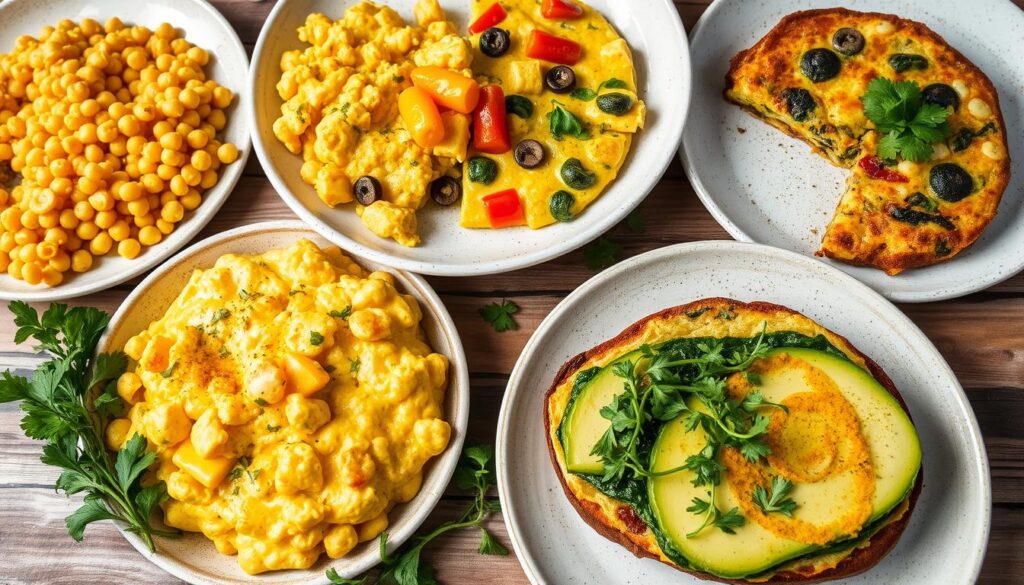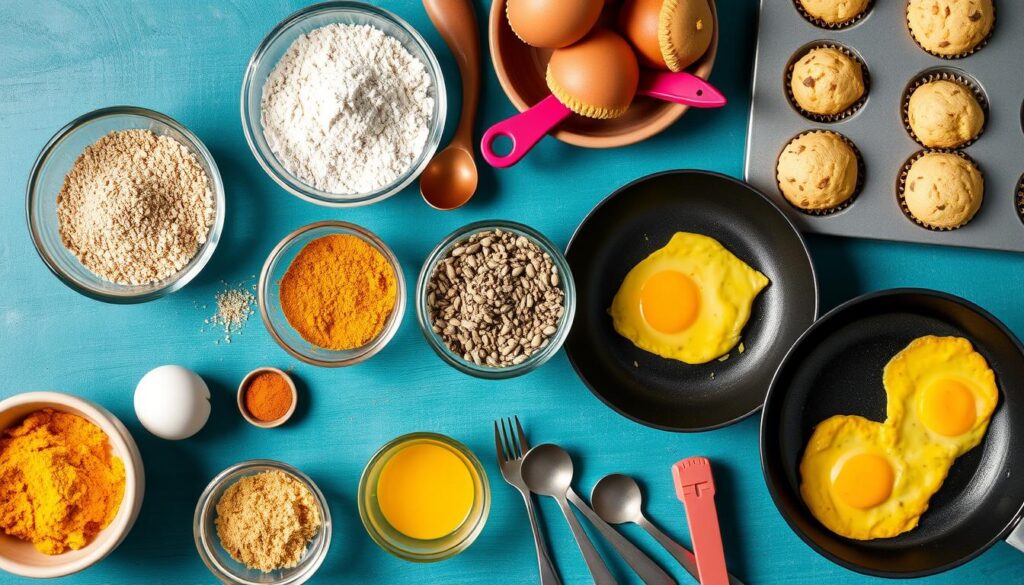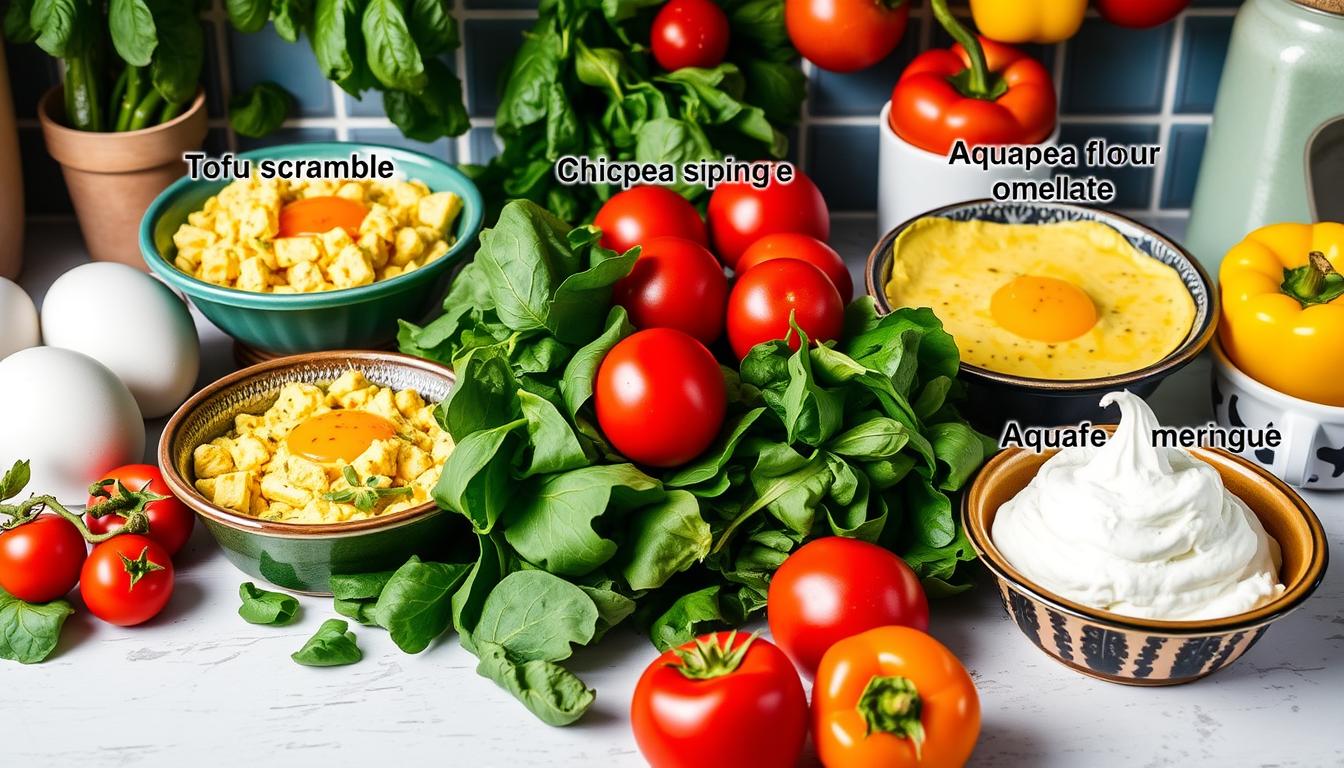Vegan eggs are a great choice for those who want a plant-based protein source. They are made from tofu, tempeh, and aquafaba. These ingredients make vegan eggs a tasty and healthy option for a better lifestyle.
More and more people are choosing vegan eggs because they are good for the planet and our health. They can be used in many recipes, making them a great choice for a healthier diet.
Vegan eggs are not just good for us, but also for the environment. They are a delicious and healthy choice for cooking. As their popularity grows, vegan eggs are becoming a staple in many homes. They offer a sustainable and compassionate alternative to traditional eggs.
Introduction to Vegan Eggs
Vegan eggs are made from plant-based ingredients, offering a unique and delicious alternative to traditional eggs. They can be used in many dishes, from scrambled eggs to baked goods. Vegan eggs are a great choice for those who want to live a healthier and more sustainable lifestyle.
Key Takeaways
- Vegan eggs are a cruelty-free and sustainable alternative to traditional eggs
- They offer a versatile and delicious option for those looking to adopt a plant-based lifestyle
- Vegan eggs can be used as a plant-based protein source in a variety of dishes
- They provide a healthy and sustainable alternative to traditional eggs
- Vegan eggs are made from ingredients such as tofu, tempeh, and aquafaba
- They can be used as an egg substitute in baked goods and other recipes
Understanding Vegan Eggs: A Plant-Based Revolution
Vegan eggs come from plant-based ingredients like tofu, tempeh, and aquafaba. They offer different textures and tastes. This makes vegan eggs a cruelty-free choice compared to regular eggs.
Using vegan eggs is part of a bigger push for sustainable living. They need less resources to make than traditional eggs. This change is good for the planet and our health.
What Are Vegan Eggs Made From?
- Tofu
- Tempeh
- Aquafaba
Types of Vegan Egg Alternatives
There are many vegan egg options, each with its own traits. You can make tofu scramble or aquafaba meringues. The choices are endless.
How They Compare to Traditional Eggs
Vegan eggs are as good as regular eggs in taste, texture, and nutrition. They have less cholesterol and more fiber. This makes them a hit with people who care about their health.
| Characteristic | Vegan Eggs | Traditional Eggs |
|---|---|---|
| Cholesterol | Lower | Higher |
| Fiber | Higher | Lower |
The Environmental Impact of Choosing Vegan Eggs
Choosing vegan eggs can make a big difference for our planet. Animal farming is a major cause of pollution and harm to our environment. By picking plant-based eggs, we cut down on pollution and help our planet.
Some of the eco-friendly perks of vegan eggs include:
- Lower greenhouse gas emissions
- Reduced water pollution
- Less deforestation
These advantages make vegan eggs a great choice for those who care about the environment.
Studies show that animal farming harms our planet a lot. By choosing vegan eggs, we lessen our harm to the environment. With climate change being a big issue, living sustainably is crucial.
In summary, picking vegan eggs is a simple way to help our planet. It’s a step towards a greener future and protecting our world for future generations.
Nutritional Benefits of Plant-Based Egg Alternatives
Vegan eggs are packed with nutrients, making them a great choice for a healthy diet. They are high in protein content, which helps you feel full and satisfied. They also offer essential nutrients like fiber, vitamins, and minerals.
Some of the key benefits of vegan eggs include:
- High protein content to support muscle growth and repair
- Rich in essential nutrients such as vitamin B12, iron, and zinc
- Cholesterol-free, making them a great option for those with high cholesterol or heart health concerns
Vegan eggs are a nutritious and flexible choice for those wanting more plant-based meals. They are rich in protein content, essential nutrients, and are cholesterol-free. This makes them a top pick for health-conscious eaters.
| Nutrient | Vegan Egg | Traditional Egg |
|---|---|---|
| Protein | 6-7 grams | 6-7 grams |
| Fiber | 2-3 grams | 0 grams |
| Vitamin B12 | 10-15% DV | 20-25% DV |
Best Ways to Cook With Vegan Eggs
Cooking with vegan eggs is fun and offers many cooking methods. You can make scrambled tofu, vegan omelets, and quiches. These dishes are great for any meal.
Start by looking for recipe ideas online or in books. Try new ingredients and spices to make your dishes unique. Baking, sautéing, and steaming are good ways to enhance flavors and textures.
Here are some tips for cooking with vegan eggs:
- Use a variety of spices and herbs to add flavor to your dishes
- Experiment with different types of non-dairy milk to create creamy sauces and scrambles
- Don’t be afraid to get creative and try new recipe ideas

With practice, you’ll get better at cooking with vegan eggs. It doesn’t matter if you’re new to cooking or experienced. Now is a great time to explore vegan egg dishes and find new favorites.
| Recipe | Cooking Method | Ingredients |
|---|---|---|
| Vegan Omelet | Sautéing | Tofu, non-dairy milk, spices |
| Vegan Quiche | Baking | Tofu, non-dairy milk, vegetables |
Mastering Vegan Egg Substitutes in Baking
Baking with vegan egg substitutes requires knowing the different types and their uses. Flaxseed, chia seeds, and aquafaba are popular choices. Each has unique binding properties. By picking the right one and following simple tips, you can make delicious, moist treats.
Converting recipes to use vegan egg substitutes is key. It means replacing eggs with a suitable substitute and adjusting the recipe. With practice, you can become skilled at this and enjoy many vegan baked goods.
Binding Properties in Recipes
Binding properties are essential in baking. They help ingredients stick together. Flaxseed and chia seeds are great for this, making them perfect for cakes, cookies, and muffins.
Moisture and Texture Control
Controlling moisture and texture is also important. Aquafaba can make baked goods light and airy. Flaxseed adds moisture and density. Knowing the properties of each substitute helps you achieve the right texture and moisture.
- Choose the right vegan egg substitute for your recipe
- Adjust proportions and measurements accordingly
- Experiment with different binding properties and moisture levels
By following these tips and mastering vegan egg substitutes, you can make a variety of delicious, moist baked goods. They’re great for any occasion.
Popular Brands and Products in the Vegan Eggs Market
The vegan eggs market is booming, with many vegan egg brands leading the way. Brands like Follow Your Heart, Ener-G, and Bob’s Red Mill are making waves. They offer a variety of products, including egg substitutes, replacers, and mixes.
Customers love these brands, giving them high marks for quality and taste. For instance, Follow Your Heart’s VeganEgg is known for its egg-like texture and flavor. Ener-G’s Egg Replacer is also a hit for its simplicity and baking success.
The demand for vegan egg products is on the rise. This is thanks to growing awareness of animal welfare and environmental concerns. As a result, more companies are jumping into the market with new and tasty offerings. Some of the most sought-after items include:
- Vegan egg substitutes
- Egg replacers
- Vegan egg mixes
- Plant-based egg alternatives
The vegan eggs market is set to keep expanding. We can look forward to even more exciting and innovative products hitting the shelves.
“The vegan eggs market is a rapidly growing industry, with many companies offering innovative and delicious products. As consumer awareness of animal welfare and environmental issues continues to grow, we can expect to see even more exciting developments in this market.”
| Brand | Product | Description |
|---|---|---|
| Follow Your Heart | VeganEgg | Egg substitute with scrambled egg-like texture and taste |
| Ener-G | Egg Replacer | Egg replacer for baking and cooking |
| Bob’s Red Mill | Vegan Egg Mix | Plant-based egg alternative for baking and cooking |
Storage Tips and Shelf Life Guidelines
Keeping vegan eggs fresh is key. Store them in the fridge at 40°F (4°C) or below. This keeps them safe and tasty longer.
Always check the expiration date before eating vegan eggs. If they smell bad or feel slimy, throw them away. Here are some tips for storing them right:
- Store vegan eggs in their original packaging or a covered container to prevent contamination.
- Keep them away from strong-smelling foods, as vegan eggs can absorb odors easily.
- Freeze vegan eggs if you don’t plan to use them within a few days of opening. Frozen vegan eggs can be stored for up to 6 months.
By following these tips, you can enjoy your vegan eggs safely. Always handle and store them properly for the best taste and quality.
| Storage Method | Shelf Life |
|---|---|
| Refrigerated | Up to 7 days |
| Frozen | Up to 6 months |
Common Challenges and Solutions When Using Vegan Eggs
Using vegan eggs can sometimes lead to texture and flavor issues. To fix these problems, it’s helpful to know some troubleshooting tips. Getting the right consistency and texture is key, and there are simple ways to do it.
For example, adding a little more liquid or adjusting the cooking time can greatly improve your dish. Also, adding spices and herbs can make the flavor of vegan eggs more appealing.

- Checking the expiration date of the vegan egg product
- Storing the product properly to maintain its quality
- Experimenting with different brands and types of vegan eggs to find the one that works best for you
By following these tips, you can easily solve common problems. This way, you can make delicious dishes with vegan eggs. Troubleshooting becomes much easier.
Making the Switch: Transitioning to Vegan Eggs
Switching to a vegan lifestyle is easy and tasty with the right help. Finding good egg substitutes is a big step. These can replace eggs in your favorite dishes.
Choosing vegan eggs has many health perks. A vegan diet cuts down on bad fats and cholesterol.
Here are some tips for a smooth transition:
- Try out different egg substitutes like tofu or aquafaba to see what you like.
- Look for new recipes and flavors to keep your diet exciting.
- Join vegan groups or find friends who share your interests for support.
With more plant-based options available, switching to vegan is easier than ever. Using egg substitutes makes your diet kinder and greener.
Every little change helps, and starting with vegan eggs is a great move. A bit of creativity and trying new things can make your plant-based diet both tasty and fulfilling.
| Egg Substitute | Usage |
|---|---|
| Tofu | Scrambles, omelets, and baked goods |
| Aquafaba | Meringues, mayonnaise, and cakes |
| Flaxseed | Baked goods, smoothies, and salads |
Conclusion: Embracing a Sustainable and Compassionate Future with Vegan Alternatives
Vegan eggs are a tasty and sustainable choice compared to regular eggs. They help us live a compassionate and eco-friendly life. By picking vegan alternatives, we help make the world a better place for animals and our planet.
Switching to vegan eggs is easy and makes a big difference. They taste great and don’t harm animals. Let’s work together to make our world kinder and greener by choosing plant-based foods.
FAQ
What are vegan eggs made from?
Vegan eggs come from plants like tofu, tempeh, and aquafaba. Aquafaba is the liquid from canned chickpeas. These ingredients mimic eggs in texture and function.
What are the different types of vegan egg alternatives?
You can find tofu scramble, aquafaba meringues, and flaxseed or chia seed egg replacers. These are popular vegan egg options.
How do vegan eggs compare to traditional eggs in terms of nutrition?
Vegan eggs are rich in protein, fiber, and nutrients. They’re also cholesterol-free. This makes them a healthier choice for many.
What are the environmental benefits of choosing vegan eggs?
Vegan eggs are better for the planet. They don’t cause greenhouse gas emissions, deforestation, or water pollution like animal eggs do.
What are some tips for cooking with vegan eggs?
Use vegan eggs in scrambles, omelets, and baked goods. Adjust cooking times and temperatures. Try different alternatives to find the best fit for your recipe.
How do I use vegan egg substitutes in baking?
Vegan egg substitutes add binding, moisture, and texture to baked goods. Use ground flaxseed, chia seeds, or aquafaba. Each has unique properties for different recipes.
What are some popular vegan egg brands and products on the market?
Brands like JUST Egg, Follow Your Heart Vegan Egg, and Vegg offer plant-based egg alternatives. They’re great for cooking and baking.
How should I store vegan eggs, and how long do they last?
Store vegan eggs in the fridge. Check for spoilage signs like off-odors or discoloration before using.
What are some common challenges when using vegan eggs, and how can I overcome them?
Achieving the right texture and flavor can be tough. Try different alternatives, adjust cooking methods, and use spices and herbs to enhance flavor.
What tips can you provide for transitioning to vegan eggs?
Start by adding vegan eggs to your diet gradually. Experiment with recipes and cooking methods. Learning about vegan eggs and connecting with others can also help.

